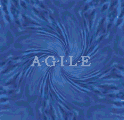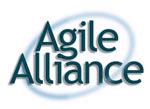
Abrahasson, Pekka et al.
Agile software development: Review and Analysis. ESPOO 2002, VTT Publications 478. 107p.
Keywords: Software development, agile processes, agile methods, extreme programming, agile modelling, open source software development, software project management
Abstract: Agile--denoting "the quality of being agile; readiness for motion, nimbleness, activity, dexterity in motion"--software development methods are attempting to offer an answer to the eager business community asking for lighter weight along with faster and nimbler sofware development processes. This is especially the case with the rapidly growing and volatile Internet software industry as well as for the emerging mobile application environment. The new agile methods have evoked a substantial amount of literature and debates. However, academic research on the subject is still scarce, as most of existing publications are written by practitioners or consultants.
The aim of this publication is to begin filling this gap by systematically reviewing the existing literature on agile sofware development methodologies. This publication has three purposes. First, it proposes a definition and a classification of agile software development approaches. Second, it analyses ten sotware development methods that can be characterized as being "agile" against the defined criteria. Third, it compares these methods and highlights their similarities and differences. Based on this analysis, future research needs are identified and discussed.






